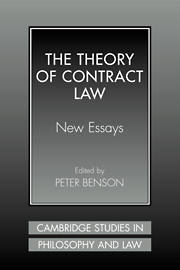Book contents
- Frontmatter
- Contents
- Acknowledgments
- Contributors
- Introduction
- 1 Two Economic Theories of Enforcing Promises
- 2 The Scope and Limits of Legal Paternalism: Altruism and Coercion in Family Financial Arrangements
- 3 Promises and Contracts
- 4 The Unity of Contract Law
- 5 The Theory of Contracts
- 6 Contract Law in the Aristotelian Tradition
- Index
6 - Contract Law in the Aristotelian Tradition
Published online by Cambridge University Press: 05 October 2009
- Frontmatter
- Contents
- Acknowledgments
- Contributors
- Introduction
- 1 Two Economic Theories of Enforcing Promises
- 2 The Scope and Limits of Legal Paternalism: Altruism and Coercion in Family Financial Arrangements
- 3 Promises and Contracts
- 4 The Unity of Contract Law
- 5 The Theory of Contracts
- 6 Contract Law in the Aristotelian Tradition
- Index
Summary
Introduction
Aristotle's works on ethics, politics, physics, and metaphysics were rediscovered in the West toward the end of the twelfth century. For a long time thereafter, many regarded him, in Dante's words, as “the master of those who know.” In the seventeenth century, Hobbes could still complain that his ideas dominated the “the Philosophy-schooles, through all the universities of Christendome.”
During these centuries, as I have described elsewhere, philosophers and jurists built the first systematic theory of contract law. It was a synthesis of Aristotelian philosophy and Roman law. Roman law had been studied in Western universities since its rediscovery about 1100. For all their subtlety, however, the Roman jurists were not theorists. A first step toward a theory was taken by Thomas Aquinas who developed a systematic moral philosophy based on Aristotle, which incorporated Roman legal concepts and rules. Gradually, jurists borrowed ideas from Aristotle and Thomas and read them into Roman texts. Then, in the sixteenth and early seventeenth centuries, a group centered in Spain and known to historians as the “late scholastics” tried to explain as much of Roman law as possible on Aristotelian and Thomistic principles. Among the leaders of this group were Domingo de Soto (1494–1560), Luis de Molina (1535–1600), and Leonard Lessius (1554–1623). They gave Roman law a theory and a systematic doctrinal organization for the first time.
In the seventeenth century, the founders of modern critical philosophy broke with the Aristotelian tradition. Paradoxically, during the same century, many of the conclusions of the late scholastics were borrowed and disseminated throughout Europe by the founders of the northern natural law school, Hugo Grotius (1583–1645) and Samuel Pufendorf (1632–94).
- Type
- Chapter
- Information
- The Theory of Contract LawNew Essays, pp. 265 - 334Publisher: Cambridge University PressPrint publication year: 2001
- 8
- Cited by



